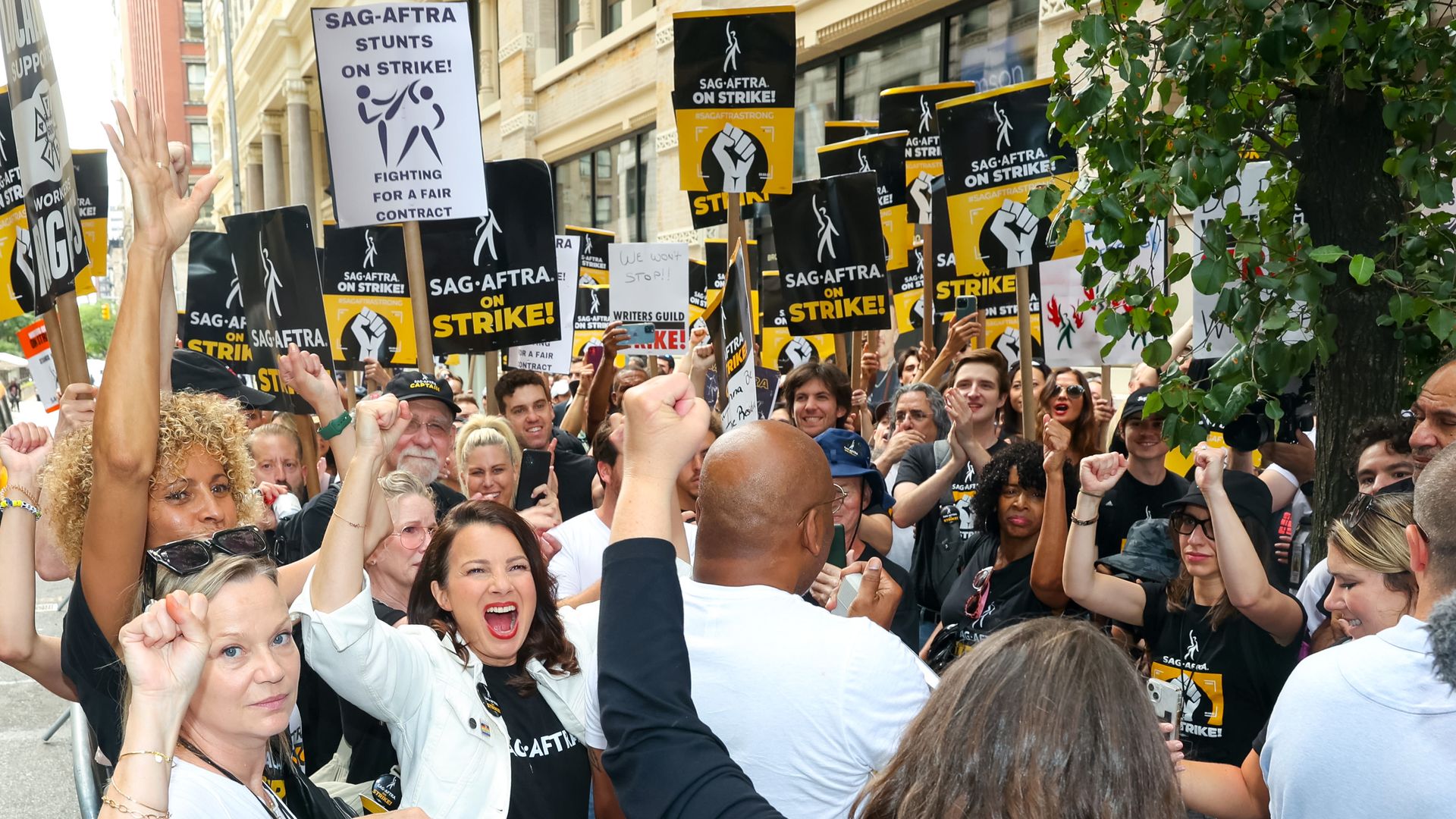Hollywood actors reach deal with studios to end strike
Add Axios as your preferred source to
see more of our stories on Google.

SAG-AFTRA members picketing in New York City. Photo: Jose Perez/Bauer-Griffin/GC Images
SAG-AFTRA, the union that represents Hollywood actors, on Wednesday announced a tentative agreement with the major studios that will end their 118-day strike.
Why it matters: The deal, if ratified by the union's members, would bring an end to a lengthy labor battle that has halted TV and film production for months.
- The studios and Hollywood writers' union reached a deal in September after a 148-day strike that began in May. The contract was overwhelmingly ratified by 99% of WGA members who voted on it.
Details: The strike will officially end on Thursday at 12:01 am PT.
- A deal was finally hammered out after a third round of negotiating between the two sides.
- Like the writers, the actors' union was seeking better residuals compensation for TV shows and films on streaming, as well as safeguards against studios' use of generative AI.
- In a statement Wednesday night, SAG-AFTRA said the deal was valued "at over one billion dollars" and contains "unprecedented provisions for consent and compensation that will protect members from the threat of AI" as well as a "streaming participation bonus."
- The full details of the detail will be shared with union members on Friday.
What they're saying: The Alliance of Motion Picture and Television Producers said in a statement late Wednesday that the tentative agreement "represents a new paradigm" and it looked forward to the industry "resuming the work of telling great stories."
- The deal "gives SAG-AFTRA the biggest contract-on-contract gains in the history of the union, including the largest increase in minimum wages in the last forty years; a brand new residual for streaming programs; extensive consent and compensation protections in the use of artificial intelligence; and sizable contract increases on items across the board," the AMPTP said.
The big picture: The first dual-strike in Hollywood in 63 years brought the industry to a six-month standstill, one of the lengthiest work stoppages in the industry's history.
- The strike was the second-longest in SAG history, and the longest against the Hollywood studios. In 2000, the union went on strike for 182 days against the American Association of Advertising Agencies.
- Virtually all production of scripted content had been shut down since July, when the actors' union joined the writers guild in striking. That led to a cascade of production delays for both TV and films.
- Late night shows resumed shortly after the writers strike ended — but it will be still be months before scripted production picks up again, likely leading to even more film and TV production delays.
- The strike took a financial toll on media giants and states that are production hubs. For example, Warner Bros. said the strike will wipe out as much as $500 million in earnings this year. Economists estimate the strikes will have at least a $5 billion impact on the U.S. economy.
Yes, but: The International Alliance of Theatrical Stage Employees (IATSE), which represents below-the-line crew members such as set and costume designers, opens contract negotiations with the studios next year.
- An IATSE strike was narrowly averted in 2021, during the last round of labor talks.
Of note: The Directors Guild of America, which was the only major Hollywood union to avoid a labor stoppage this year, congratulated SAG-AFTRA on the deal.
- "Directors and their teams look forward to our industry getting back to work and collaborating with actors, writers, craftspeople and crews to create film and television that entertains billions around the world," the DGA said in a statement.
What's next: The tentative agreement must be ratified by SAG-AFTRA members before it is finalized. That will likely take a few weeks.
Editor's note: This article has been updated with comment from SAG-AFTRA and the Directors Guild of America.
